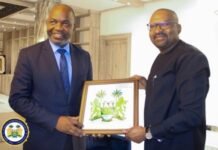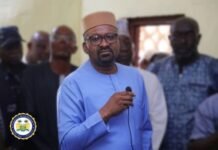By Foday Moriba Conteh
Gender-based violence (GBV) is an ongoing global crisis and Sierra Leone is no exception. According to a report by The Guardian on September 4, 2024, the march toward gender equality has stalled or even reversed for over a billion women and girls worldwide. This alarming regression has left many vulnerable to abuse and the reality is no different in Sierra Leone. Despite countless reports, protests and official statements, significant and impactful action remains elusive.
The rise in GBV cases in Freetown has become impossible to ignore. Just two weeks ago, a young woman from Cornerstone Ministries tragically lost her life, allegedly beaten to death by her partner. This horrific event shocked the local community, leaving many struggling to come to terms with such a senseless loss.
In a separate incident, viral images recently surfaced showing a Police Officer violently assaulting his partner. These episodes reveal the true extent of Sierra Leone’s GBV crisis – one that is far beyond isolated occurrences and in desperate need of immediate intervention.
To effectively address GBV in Sierra Leone, it is vital to understand the deep-seated cultural and societal norms that enable it. Janisa Momodu Esq, a gender rights advocate, explains that GBV encompasses a broad range of harmful behaviors – physical, sexual, psychological and economic – directed toward individuals based on their gender. In Sierra Leone, patriarchal traditions remain deeply ingrained, fostering environments where men exercise control over women, both at home and in public spaces. This power imbalance creates conditions where violence thrives, often unchecked and underreported.
“The stigma surrounding GBV is one of the major barriers to change,” said Janisa Momodu. “Victims fear being ostracized or retaliated against by their abusers, making it easier for perpetrators to act with impunity. In many cases, law enforcement fails to protect victims – and as seen in the recent case involving a Police Officer, sometimes becomes the perpetrator.” This stark example erodes public trust in the justice system and perpetuates a cycle of violence that continues unchecked.
Whenever a shocking GBV case arises, the public is quick to respond with outrage, protests and official statements. While these reactions are necessary to raise awareness, they often fail to lead to meaningful, long-term change. “All too often, these efforts are temporary,” Janisa Momodu continued. “Once the initial shock fades, attention wanes and nothing substantial is done to address the root causes of GBV.”
This pattern is not unique to Sierra Leone. Around the world, GBV is often treated as a secondary issue. While Government condemnation of these heinous acts is essential, it is meaningless without accompanying policy reforms, law enforcement accountability and comprehensive support for survivors. Without sustained, concrete actions, the issue will persist and the survivors will continue to suffer in silence while perpetrators escape punishment.
The growing number of GBV cases in Sierra Leone is a call to action. Each act of violence against women is not only a violation of their rights but also an attack on the core values of human dignity, justice and equality. The recent cases reflect systemic failures and inequalities that disproportionately affect women, girls and marginalized communities.
As a Gender, Globalization and Rights fellow, Janisa Momodu condemns the brutality and inaction surrounding GBV. “We must recognize that when law enforcement becomes the perpetrator, it signals a deeper societal failure,” she said. “The time for half measures is over. We need systemic change, starting with holding perpetrators accountable, no matter their position or profession.”
She also emphasized the importance of global interconnectedness in addressing GBV, noting how globalization ties Sierra Leone’s struggle to those of women across the globe. “GBV affects not only individuals but also the health and progress of nations. We cannot afford to ignore the intersection of gender inequality, economic disenfranchisement and human rights violations,” she remarked.
Janisa Momodu, who has extensively researched the socio-economic impact of GBV in Freetown, is deeply troubled by the surge in violence. She called on the Sierra Leonean Government, civil society and international partners to take immediate and decisive action. “To build a future free from fear and violence, we must adopt a comprehensive, long-term approach,” she urged. “This includes holding perpetrators accountable and ensuring justice for survivors.”
Key solutions include strengthening legal frameworks that protect women and vulnerable communities, investing in educational campaigns to address harmful gender norms and providing accessible support services for survivors, such as shelters, legal aid and mental health care. She further underscored the importance of fostering gender equality by empowering women and girls in decision-making processes. “This is not just a women’s issue; it’s a human issue. We must treat it as such,” she asserted.
As Sierra Leone faces this growing crisis, Janisa Momodu remains committed to advocating for a future where gender equality and human rights are fully realized. “The ideas shared here are just the beginning of a crucial conversation. With the right strategies and a true commitment from all sectors of society, we can eradicate GBV,” she concluded.
Together, Sierra Leone must work to end this crisis – not just as an urgent response to current violence but as a commitment to future generations, ensuring that gender-based violence is never tolerated.




